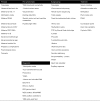Emerging biomarkers in autism spectrum disorder: a systematic review
- PMID: 32042808
- PMCID: PMC6989979
- DOI: 10.21037/atm.2019.11.53
Emerging biomarkers in autism spectrum disorder: a systematic review
Abstract
Autism spectrum disorder (ASD) affects approximately 2% of children in the United States (US) yet its etiology is unclear and effective treatments are lacking. Therapeutic interventions are most effective if started early in life, yet diagnosis often remains delayed, partly because the diagnosis of ASD is based on identifying abnormal behaviors that may not emerge until the disorder is well established. Biomarkers that identify children at risk during the pre-symptomatic period, assist with early diagnosis, confirm behavioral observations, stratify patients into subgroups, and predict therapeutic response would be a great advance. Here we underwent a systematic review of the literature on ASD to identify promising biomarkers and rated the biomarkers in regards to a Level of Evidence and Grade of Recommendation using the Oxford Centre for Evidence-Based Medicine scale. Biomarkers identified by our review included physiological biomarkers that identify neuroimmune and metabolic abnormalities, neurological biomarkers including abnormalities in brain structure, function and neurophysiology, subtle behavioral biomarkers including atypical development of visual attention, genetic biomarkers and gastrointestinal biomarkers. Biomarkers of ASD may be found prior to birth and after diagnosis and some may predict response to specific treatments. Many promising biomarkers have been developed for ASD. However, many biomarkers are preliminary and need to be validated and their role in the diagnosis and treatment of ASD needs to be defined. It is likely that biomarkers will need to be combined to be effective to identify ASD early and guide treatment.
Keywords: Autism spectrum disorder (ASD); biomarkers; epigenetic; eye movement; folate; genetic; methylation; mitochondria; neuroimmune; neurophysiology; redox.
2019 Annals of Translational Medicine. All rights reserved.
Conflict of interest statement
Conflicts of Interest: Dr. Frye is funded by the National Institutes of Health, Department of Defense, and Autism Speaks and receives support from the The Turnabout for Autism and Autism Research Institute foundations and Zynerba Pharmaceuticals. The author is on the advisory boards of Iliad Neurosciences, NeuroNeeds and Cox Biosciences. Dr. Rossignol is on the advisory board of NeuroNeeds.
Figures

References
Publication types
LinkOut - more resources
Full Text Sources
Other Literature Sources
Medical
